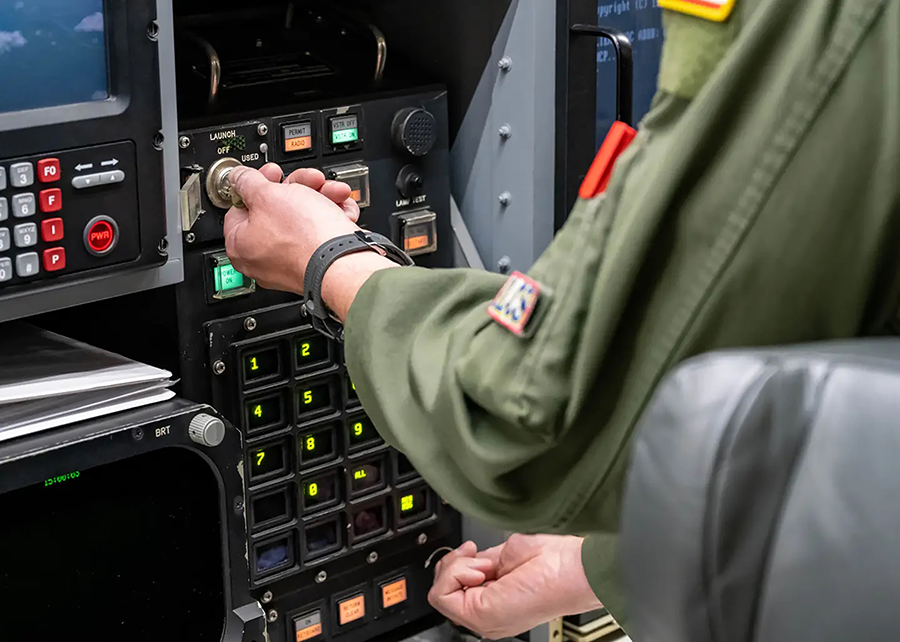Russian ICBM Test Raises Questions for Kazakhstan
May 2023
By Gabriela Iveliz Rosa Hernández
Russia’s launch of an intercontinental ballistic missile (ICBM) from its territory to a test site in Kazakhstan has raised questions about Kazakhstan’s compliance with a 2017 treaty banning nuclear weapons.
 Kazakhstan, a leader on disarmament and nonproliferation issues, ratified the Treaty on the Prohibition of Nuclear Weapons (TPNW) in 2019. But the Russian Defense Ministry announced the launch on April 11 of a missile whose training warhead reached the designated target at the Sary-Shagan test site, which is leased by Russia from Kazakhstan.
Kazakhstan, a leader on disarmament and nonproliferation issues, ratified the Treaty on the Prohibition of Nuclear Weapons (TPNW) in 2019. But the Russian Defense Ministry announced the launch on April 11 of a missile whose training warhead reached the designated target at the Sary-Shagan test site, which is leased by Russia from Kazakhstan.
“This [missile] launch made it possible to confirm the correctness of the circuit design and technical solutions used in the development of new strategic missile systems,” the ministry reported in a statement.
It was the first time since 2019 that Russia has used the site to test ICBMs.
The TPNW, which entered into force in January 2021, is the first legally binding international agreement to comprehensively prohibit nuclear weapons with the ultimate goal of their total elimination.
It bars states-parties from assisting anyone in anyway in a prohibited activity. Specifically, the treaty says states-parties promise to “never under any circumstances...assist, encourage or induce, in any way, anyone to engage in any activity prohibited to a state-party under this treaty.” In addition, they forswear to “allow any stationing, installation or deployment of any nuclear weapons or other nuclear explosive devices in its territory or at any place under its jurisdiction or control.”
The Nuclear Weapon Ban Monitor, a watchdog group, noted on April 12 that Kazakhstan’s actions were not consistent with the TPNW. “This is no doubt a difficult situation for Kazakhstan, but it is also an opportunity to demonstrate the significance of the TPNW. As a state committed to the goals of the TPNW and the Central Asian Nuclear-Weapon-Free Zone Treaty, Kazakhstan should communicate its priorities to Russia and request that it refrains from all testing of nuclear-capable missiles at Sary-Shagan,” according to a group statement.
Meanwhile, Pavel Podvig, an expert on Russian strategic nuclear forces, said in an April 12 tweet that the missile launch “was an important test for the TPNW and…not an easy one.”
“Sary-Shagan is largely a missile defense site [that] was used by the Soviet Union to test various defense-related systems—radars and interceptors in particular [and]…one can argue that missile defense may be TPNW-compliant.”
But he added that the “situation with the Kapustin Yar [Russian test site] to Sary-Shagan launches is a bit different. These are tests of ICBMs.… ICBMs are very much dedicated nuclear weapon delivery systems.”
Kazakhstan insisted that it remained in full compliance with the TPNW.
“Taking into account that no nuclear weapons or nuclear explosive devices (or their indivisible parts) are being in any way placed, tested, or utilized on the territory of Kazakhstan (including at certain military facilities rented to third parties in accordance with existing international agreements), Kazakhstan remains in full compliance with its obligations under the TPNW,” the Kazakh embassy in Brussels wrote on April 12 when asked by EURACTIV whether the missile test constituted a breach of the TPNW.
The Kazakh-Russian leasing agreement for the test site states that “nuclear and chemical weapons” are prohibited on the test site.
The agreement was last amended in 2015 and is automatically renewed every 10 years unless one party notifies the other party in writing at least six months prior to the expiration of the agreement.
Last December, the Russian Strategic Forces announced that it planned to carry out eight launches of ICBMs in 2023, from the Plesetsk cosmodrome and from the 4th State Central Interspecific Test Site Kapustin Yar.
According to the leasing agreement, Kazakhstan and Russia agree on annual plans for research, tactical exercises with live-fire missile launches, the maintenance and repair of weapons and military equipment, and schedules for testing.
